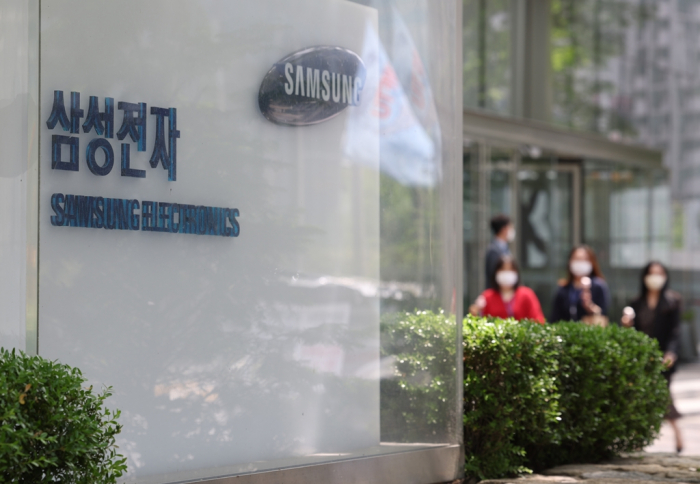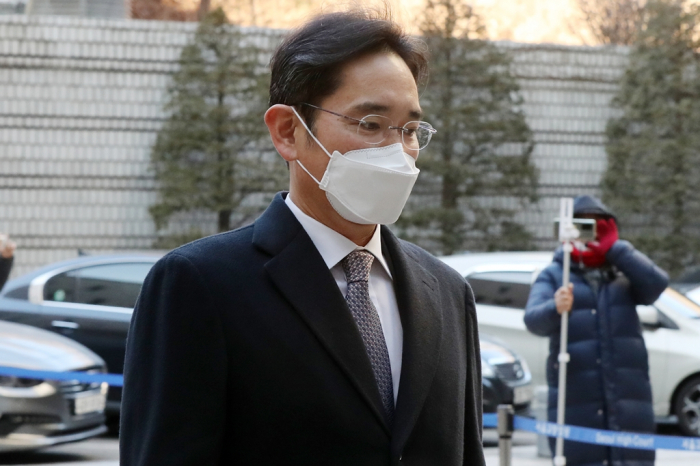Two unopened ways Samsung Elec. bolsters share prices
Samsung has mulled additional steps to boost shareholder value, including share buybacks; now urges executives to buy back stocks
By May 04, 2022 (Gmt+09:00)
LG Chem to sell water filter business to Glenwood PE for $692 million


Kyobo Life poised to buy Japan’s SBI Group-owned savings bank


KT&G eyes overseas M&A after rejecting activist fund's offer


StockX in merger talks with Naver’s online reseller Kream


Mirae Asset to be named Korea Post’s core real estate fund operator



Samsung Electronics Co., South Korea’s largest company by market capitalization, has tried to boost its recently battered share price -- especially through share buybacks -- but measures to boost shareholder value have yet to lift stocks.
Samsung, the world’s top memory chipmaker is unlikely to seek further large-scale share buybacks as its Vice Chairman Jay Y. Lee is expected to be absent longer than hoped for without a pardon.
Samsung is thus reportedly considering additional steps to raise shareholder value due to the recent share price drop on the assumption that the government pardons Lee, the head of the South Korean tech giant. But the country’s outgoing President Moon Jae-in is known to have decided not to pardon him despite mounting calls for an amnesty. Lee has been on parole since August 2021 after serving 18 months of his 30-month prison term for a bribery and embezzlement conviction.
Earlier this year, Samsung maintained its policy to return 50% of its free cash flow to shareholders while setting aside 9.8 trillion won ($8 billion) for regular annual dividends.
The South Korean tech giant reportedly sought more measures to bolster stock prices as it fell to as low as 64,500 won last month, its weakest point since November 2020.
“The measures have been more likely to be share buybacks since the company needs shareholder support to raise dividends but not to buy back shares. So they will buy back the shares themselves,” said an industry source.
GENERAL BUYBACKS UNLIKELY AMID LEADERSHIP VACUUM
Share buybacks and cancellations often boost stock prices as they reduce the number of outstanding shares on the market and boost earnings per share. US tech giant Apple Inc. bought back and canceled $85.5 billion in shares last year when its share prices jumped to around $170 from around $130.
Samsung, however, has not taken such a step since its 9.3 trillion won share buyback in 2017 following Lee’s bribery and embezzlement charges, which involved the impeachment of former president Park Geun-hye in 2017.
But calls for share buybacks increased recently with the number of Samsung’s shareholders topping 5 million, causing the company to consider such steps to boost shareholder value, industry sources said.
But now it is unlikely to implement the measure due to the sustained leadership vacuum, sources said. Without a pardon, Lee is unable to return to Samsung management until the second half of 2027, given the country’s law governing special economic crimes.

“Samsung needs to spend billions of dollars on a share buyback, but Vice Chairman Lee is the only person who can make a decision,” said a source for investor relations at the company. “It will be difficult to expect a large-scale share buyback for the time being.”
So Samsung has found another way to support share prices.
EXECS URGED TO BUY BACK SHARES, EVEN WITH LOANS
Samsung has urged executives to buy back shares as such purchases are seen as a positive factor for stock prices. A company’s executives and employees often buy back stocks when they feel confident about the future and see their stock prices as undervalued.
But one Samsung vice president was surprised by a recent internal email urging them to buy back shares, which added the company would help arrange loans for the purchase.
“The IR team often sends emails to update share prices, but it was the first time they mentioned loans,” said the vice president. “This shows how concerned they are about stock prices.”
Some other vice presidents were not happy with the email since they lost money after buying back shares due to weaker stock prices.
“I bought lots of stocks around 80,000 won per share, following the company’s policy, but now they are lower than 70,000 won,” complained another vice president. “It would be fine if executives voluntarily bought them. But I am not happy as I was forced to buy them.”
EXECUTIVES RELUCTANT TO INVEST DUE TO REGULATIONS
Executives were reluctant to invest in the shares as they need to announce their stock transactions of company shares through a regulatory filing.
Key shareholders including the top stockholder and registered executives must announce changes in their stock holdings within five trading days of buying or selling shares, according to the country’s laws.
These disclosures unveil details on the number of shares they buy or sell, as well as the prices of their transactions.
Such facts are seen as necessary information to other shareholders, but some executives have hesitated to buy back stocks in their own companies as they are regulated to unveil details of their investment.
Write to Shin-Young Park at nyusos@hankyung.com
Jongwoo Cheon edited this article.
-
 Samsung GroupJay Y. Lee absence raises risks for Samsung chip biz
Samsung GroupJay Y. Lee absence raises risks for Samsung chip bizApr 24, 2022 (Gmt+09:00)
6 Min read -
 Tech, Media & TelecomSamsung's Lee to be released on parole on Aug. 13
Tech, Media & TelecomSamsung's Lee to be released on parole on Aug. 13Aug 09, 2021 (Gmt+09:00)
4 Min read


